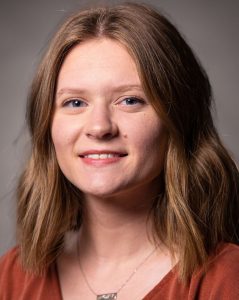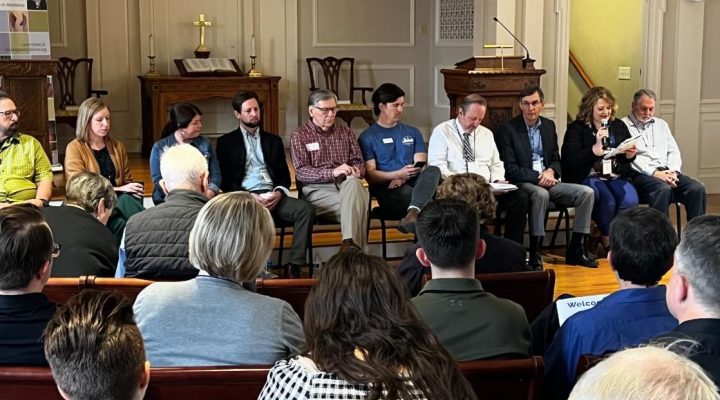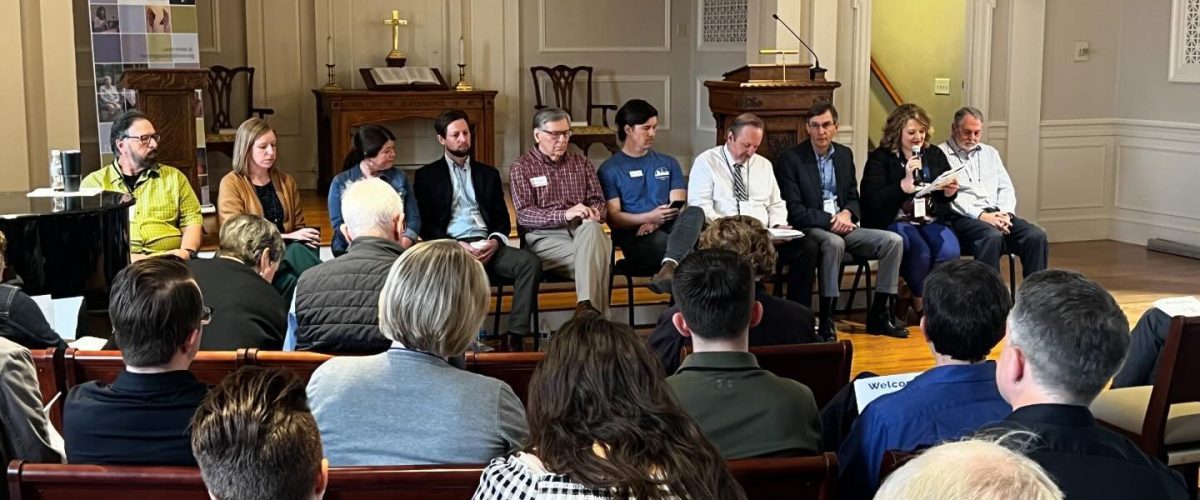Last Friday, I attended the Cooperative Baptist Fellowship of North Carolina’s 30th anniversary gathering at First Baptist Church of Greensboro, N.C. The theme of “thriving together” took on particular interest to me as a young seminarian because of one of the workshops.
In the weeks leading up to the gathering, I kept hearing talk of a panel on LGBTQ Christians, and how they fit into the body of Christ. Then I was disappointed to hear friends and colleagues telling me they worried the panel might not happen. For many of my LGBTQ friends and colleagues, this was just another bullet point waiting to be added to the list of disappointments they’ve experienced in Christian spaces.

Mallory Challis
After all, the workshop seemed to fit the gathering’s theme perfectly, considering the significant progress CBF has made in the past 30 years. If we are thriving together in the pursuit of God’s humble, justice-oriented work, shouldn’t this be the perfect kind of gathering to continue having hard conversations about inclusion and sexuality?
To be sure, there is a diversity of opinion nationwide among CBF churches about LGBTQ inclusion, and the national organization has struggled to maintain unity amid this diversity. The same can be said for CBF North Carolina, which encompasses churches with diverse views on this subject.
But that doesn’t mean we shouldn’t talk about it and learn. To my delight, the panel did happen, and I attended.
In fact, 152 of us gathered in a small chapel to listen to 10 North Carolina Baptist minsters tell their stories of becoming, or being in process toward becoming, welcoming and affirming churches. The room was full to overflowing, with some people standing for the entire hour.
Moderated by Emily Hull McGee, lead pastor at First Baptist Church on Fifth in Winston-Salem, the panel was titled, “Ten Stories: The Experiences of Ten Churches Who Are Becoming Communities of Hospitality for LGBTQ Folks.”
Introducing the panel, she made no mistake in proclaiming, “God’s heart is a heart of bold love and boundless compassion.” Tears welled in her eyes as she recalled the names of LGBTQ church members, young and old, who serve as beloved members of her congregation every single week. “My church’s understanding of itself is incomplete without them,” she said.
She described the process of learning about LGBTQ inclusion, which led to her church’s decision to declare themselves welcoming and affirming, as “holy ground,” even for members who began the process with skepticism.
Chris Chapman, pastor at First Baptist Church of Raleigh, said the most important part of their journey toward hospitality was the willingness to create a church that is accessible to LGBTQ Christians in all the same ways it is accessible to anyone else who comes in the doors. Chapman’s church began by simply “seeing their full dignity and inviting them,” then offering “full access to what it is to be part of our church family.”
“We are late, and we are sorry we are late, but we are here now.”
Alan Sherouse, senior pastor at First Baptist of Greensboro, the gathering’s host church, echoed these sentiments. He explained the need for churches to make their allyship known and grieved how long his congregation had taken to make that choice. “This is who we are, and we need to say it clearly,” he said. “We are late, and we are sorry we are late, but we are here now.”
Sherouse shared the stories of trans congregation members who were afraid to use their preferred names, and gay or lesbian couples who decided not to announce their engagements to the church, in fear of facing the backlash of being the first in the congregation ever to do so.
Several of the panelists also shared the importance of their churches’ process of scriptural, theological and biological education, in which they explored what LGBTQ identity and affirmation really means in the context of Christianity.
Greystone Baptist in Raleigh is still in process on this conversation, said Senior Pastor Chrissy Williamson. “We couldn’t be a place of hospitality and affirmation without educating ourselves first.”
Dennis Foust, senior pastor at St. John’s Baptist in Charlotte, said his church spent a year looking at biblical passages on marriage. In the end, they concluded biblical marriage is about commitment, not gender identity.
Michael Usey, lead pastor at College Park Baptist Church in Greensboro, invited LGBTQ members to share their testimonies with the congregation.
Mack Dennis, senior pastor at First Baptist of Asheville, led his church in an exploration of Scripture through a Christocentric lens, considering how his congregation might empathize with the LGBTQ community as a step to affirmation. “We came here through the Cross,” he said.
“We came here through the Cross.”
He recalls saying to his congregation after being asked his thoughts on gay Christians, “It would be a dream here if no LGBTQ member came here and left wanting to commit suicide.”
And from there, he led his congregation to consider how Christians might respond to and work to alleviate the pain, marginalization and suffering experienced by the LGBTQ community. “God hears their cry,” he said, and the body of Christ should respond.
Sherouse echoed this sentiment when reflecting on the loss of church members, donations and other measurable aspects of ministerial “success” in the face of becoming an affirming church. He urged listeners to worry more about the well-being of LGBTQ members, and the positive impact affirmation will have on them, than about the checkbooks or attendance numbers a church measures.
He recalled attending an “off-the-grid” session on inclusion in 2016 at nearby College Park Baptist Church during the national CBF General Assembly. He quoted a deacon from that church who told the group, “You will save more lives than you will lose people.”
Finally, the panelists offered some practical reflections from their experiences.
“The biggest cost,” Williamson said, “was the pain that happened when friends left the congregation without waiting to see what would happen.”
Although each panelist agreed the conversation was well worth it in the end, it was inevitable that some church members were not ready or willing to even try. And that was a hard hit to take for the entire congregation.
“Are you willing to be a church that welcomes anyone, which will mean you’re not a church for everyone?”
Foust agreed, posing the question, “Are you willing to be a church that welcomes anyone, which will mean you’re not a church for everyone?”
Still, panelists said they were overwhelmed at the beauty this conversation fostered within their communities. Dennis said, “It’s important to remember the resurrection, too.”
Amy Andrews, senior pastor at Cedarbridge Baptist in Greenville, said although members may leave, your church may split and things will change drastically, “there is life on the other side.”
Dennis shared the stories of members who, previously depressed and downtrodden, spiritually resurrected once they learned of their church’s willingness to accept and love them as they are. Stories like this, he said, are evidence of God’s work in the journey toward hospitality.
Bob Setzer, pastor at Knollwood Baptist in Winston-Salem, described this experience like a kaleidoscope, having many different colors, moving parts and confusing shapes that come together to form something beautiful. “All of these things become times to focus and decide.”
Besides, Jesus did not call pastors or churches to take the easy way, Setzer explained, saying Jesus urged: “Pick up the damn cross and follow me.”
Nathan Parrish, pastor at Peace Haven Baptist in Winston-Salem, said several of his LGBTQ members told him, “We just want to come to church. We don’t want to be your project. We’re tired of being objectified.”
Although this clarity does not eliminate the messiness of church life in general, it does present an opportunity for welcome. He now tells them, “You’re seeking to follow Jesus? OK. You want to get in this mess with us? We’re right here.”
And in this mess, we certainly are.
As I sat through the panel, feverishly taking notes so I could write this piece, I heard sniffles from friends and colleagues trying to hold back tears. There were head nods, verbal agreements and smiles all around the room.
When I think about what it means to thrive in Christian community, I think about the feelings of affirmation and hope experienced in that overpacked room at First Baptist Church of Greensboro.
I am glad we are having these conversations, and hope I never stop being a part of them. I’ll take the gossip, risk and all that comes with it. Because, as panelist Alan Sherouse boldly told us, “It is not un-cooperative to have this conversation.”
Mallory Challis is a master of divinity student at Wake Forest University School of Divinity. She is a former Clemons Fellow with BNG.


